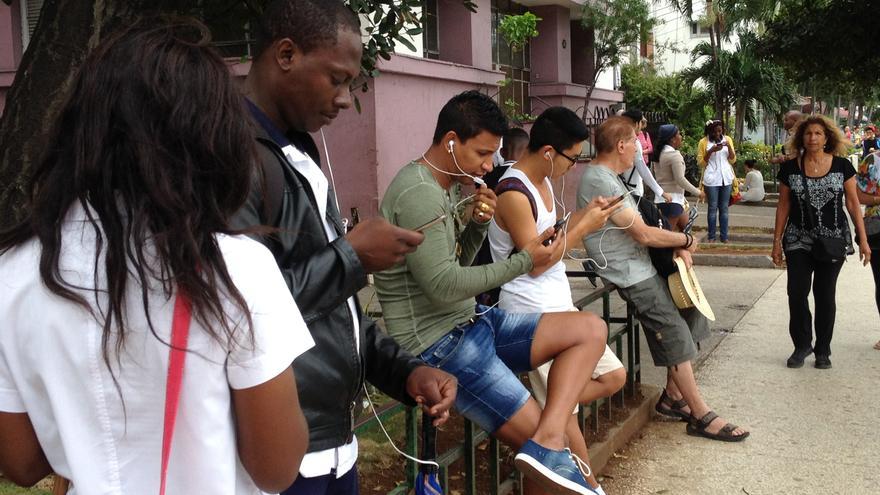
![]() 14ymedio, Havana, 7 March 2019 — In the midst of one of the worst times in its history, the Telecommunications Company of Cuba (Etecsa), surrounded by criticism and ridicule, announced on Thursday that as of March 8 4G service will be installed in several areas along the Havana coastline. This privilege will initially be only for the “highest consumption customers.”
14ymedio, Havana, 7 March 2019 — In the midst of one of the worst times in its history, the Telecommunications Company of Cuba (Etecsa), surrounded by criticism and ridicule, announced on Thursday that as of March 8 4G service will be installed in several areas along the Havana coastline. This privilege will initially be only for the “highest consumption customers.”
The arrival of 4G in this area of the capital coincides with a time of widespread dissatisfaction among the customers of the telecommunications company, due to the deterioration in the quality of web browsing from cell phones in recent weeks.
“It’s like a cannon” and “this is incredible” are phrases heard from customers who have been able to try the new 4G service for mobile browsing. From the first early of the morning the text-only message with the announcement that it was already possible to navigate to the 4G network began to appear on the phones of customers selected by the state telecommunications monopoly, as several of them confirmed to 14ymedio.
“It’s an important change because before it took me a long time to open a page, upload a photo or send a tweet but now it’s so fast that I can’t believe it,” Yusleidi, 38, one of the customers who is part of the advance party of Cubans who has managed to navigate from the mobiles with the new speed, told this newspaper.
“The first thing I did was to communicate with my brother through a WhatsApp video conference and it worked for me and was very stable,” adds José Manuel, other of the beneficiaries. “They included me in this first group because since I opened the internet service for mobile phones I have been buying 2.5 and 4 gigabyte packages,” he says.
José Manuel has a small business selling vitamins, food supplements and medicines from home. He imports them from Miami and Mexico and then distributes them throughout Havana. “That’s why I have to be very connected because most of the communication with my clients is through chat messaging.”
“I watched a piece of a series on Netflix just to test if 4G runs well,” explains a young man, who on Friday night boasted on G Street, one of Havana’s major throughfares, about being able to navigate faster. “The difference is noticeable but as soon as I left the Vedado area I lost the 4G signal and everything was slow again.”
Since Internet service from mobile phones was launched last December, users have reported constant crashes, speed problems and large areas of the country where it is not possible to go on-line during peak hours. In the last four weeks the malfunction has increased and has ended up also affecting calls and text message services.
Customers are annoyed that, despite the deterioration, Cuba’s only phone company, the state-owned Etecsa, maintains the high prices of the connection that, in its fee-for-tariff version, is 0.10 CUC per megabit, although most users prefer to use the option to buy one of the four data packages, ranging from 600 megabits for 7 CUC to 4 gigabits per 30 CUC; the latter is the equivalent of the monthly salary of a professional.
Computer scientist René Bustamante, 32, who works in a repair shop for mobile phones and computer equipment, confirmed to this newspaper that the arrival of 4G can mean “a qualitative leap in the connection but also an increase in the technological gap.” The specialist predicts that there will be “areas of the country where Etecsa’s clients will be able to use applications that in other parts of the country will not open due to the slow speeds.”
“Undoubtedly we have to take staggered steps to cover the whole country, but there are still too many people who are only using 2G,” he laments. “As always, even without having consolidated a service, another is added and this creates important differences”. In your case, the 4G will be able to “improve the business and attract a clientele that intends to explore the web beyond”.
In telecommunications, 4G is known as the fourth generation of mobile phone technologies, after 2G and 3G. It offers maximum data transmission speeds ranging from 100 Mbit/s (12.5 MB/s) in movement to 1 Gbit/s (125 MB/s) at rest.
______________________________
The 14ymedio team is committed to serious journalism that reflects the reality of deep Cuba. Thank you for joining us on this long road. We invite you to continue supporting us, but this time by becoming a member of 14ymedio. Together we can continue to transform journalism in Cuba.
